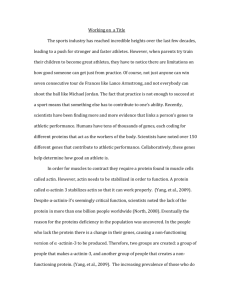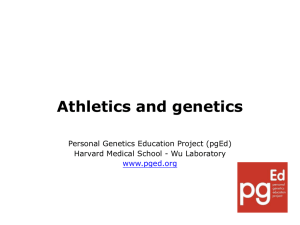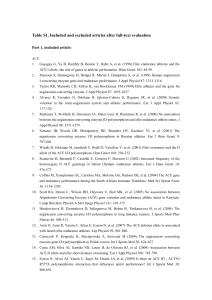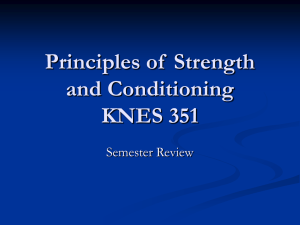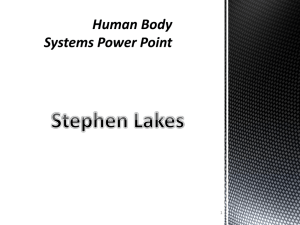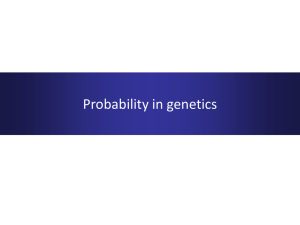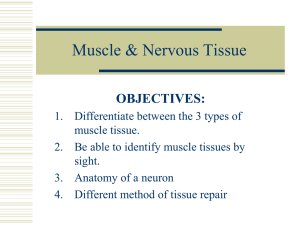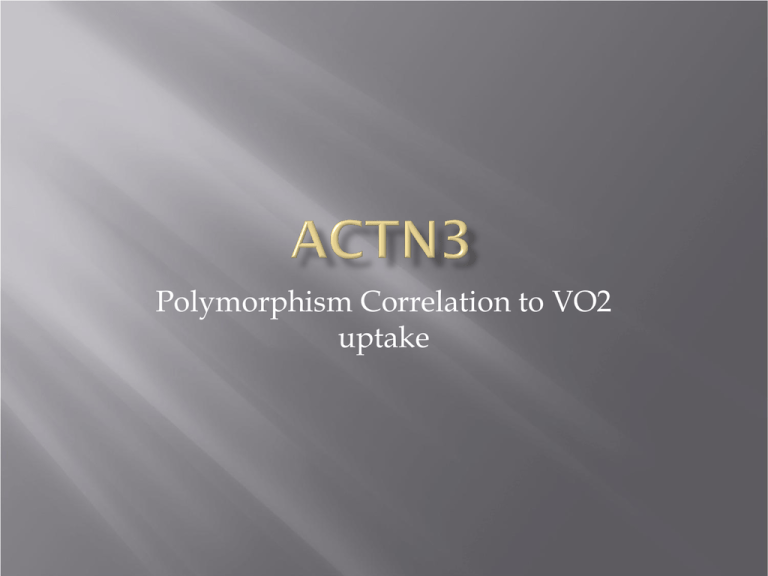
Polymorphism Correlation to VO2
uptake
ACTN3 (alpha-actinin 3) gene
Responsible for fast twitch muscle fibers in
athletic performance (power and speed)
In humans four actinin-encoding genes have
been identified, i.e. ACTN1-ACTN4. The
ACTN1 and ACTN4 genes are non-muscle
isoformeffect in the form of a disease syndrome
it was assumed that it does not play any key
role [11]. In 2003 Yang et al. proposed a
hypothesis
actinin 3 is expressed only in muscle fibres type
IIA and IIX, used in short-term effort of high
intensitythan that served by ACTN2 and most
probably mutation R577X appeared for the first
time in humans.
identified a nonsense mutation, substitution C→T
in position 1747 (C1747T) in exon 16, resulting in
the formation of a stop codon (X) in the arginine
site (R) in position 577 of the protein chain, which
results in the interruption of translation and the
formation of inactive protein forms. Individuals
with the R577X genotype do not have actinin 3 in
their fast-twitch muscle fibers.
ACTN3 is directly related to short explosive exercise such as
100m sprint
It is negated in long distance endurance athletes such as
1500m run usually displaying (XX) genotype of ACTN3
The aim of this study was to analyse polymorphism in the
alpha- ACTN3 gene, which in terms of muscle metabolism
may affect the parameter of physical efficiency of the
organism, such as the maximal oxygen uptake ( · VO2max)
3 Genotypes RX and XX are typically found more in
endurance athletes and show a deficiency in ACTN3 in fast
twitch muscle fibers
RR genotype is high levels of ACTN3 and is found in
sprinters and athletes displaying speed and power.
Various athletes were analyzed all showing
different genotypes
They were separated according to male and
female not due to ACTN3 but the fact that sex
directly effects VO2 uptake .
Anova statistical tests were used to analyze the
data for each sex and establish and plausible
correlation
http://www.doaj.org/doaj?func=abstract&id=
759591
Upon analyzing all 3 genotypes of ACTN3 it
was shown that a trend was observed for
higher VO2max values to be found in
individuals with the XX and RX genotypes.
For the R577X ACTN3 polymorphism no
statistically significant differences were found
in the volume of maximal oxygen uptake
depending on the genotype polymorphism on
the level of maximal oxygen uptake, while on
the other hand there is an observable trend for
the characteristic
There is a trend in men with the XX genotype to
obtain higher values of maximal oxygen uptake in
relation to the other ACTN3
genotypes.distribution of the RR and XX
genotypes depending on the character of practised
sports disciplines, which in turn is consistent with
most
The fact that higher values of maximal oxygen
uptake are recorded for individuals with the XX
genotype, which is characterized by a lack of
actinin 3 in muscle fibres, is consistent with the
mechanism of development of physical fitness
towards the aerobic type in case of a lack of
predisposition to generate high power by muscles
It is apparent that through this study although
ACTN3 does appear to affect athletic
performance its polymorphism of R577X has
no significant effect or correlation in regards to
the uptake of oxygen by an athlete
Individuals displaying the XX and RX
genotype do appear to be able to obtain more
oxygen while RR genotype displays dominance
in the athletes training and practicing speed
exercises and sports.
http://www.doaj.org/doaj?func=abstract&id=759591
Biology of Sport, Vol. 28 No2, 2011 105 1. Beggs A.H., Byers T.J., Knoll J.H.M., Boyce
F.M., Bruns G.A.P., Kunkel L.M. Cloning and characterization of two human skeletal
muscle alpha-actinin genes located on chromosomes 1 and 11. J. Biol. Chem.
1992;267:9281-9288. 2. Bellotti P., Benzi G., Dal Monte A., Donati A., Matteucci E.,
Vittorio C. Fizjologiczna klasyfikacja dyscyplin sportu (Physiological classification of
sports disciplines). Sport Wyczyn. 1982;10:214 (in Polish). 3. Clarkson P.M., Hoffman
E.P., Zambraski E., Gordish-Dressman H., Kearns A., Hubal M., Harmon B., Devaney
J.M. ACTN3 and MLCK genotype associations with exertional muscle damage. J. Appl.
Physiol. 2005;99:564-569. 4. Druzhevskaya A.M., Ahmetov I.I., Astratenkova I.V.,
Rogozkin V.A. Association of the ACTN3 R577X polymorphism with power athlete
status in Russians. Eur. J. Appl. Physiol. 2008;103:631-634. 5. Garland T. Jr, Bennett
A.F., Daniels C.B. Heritability of locomotor performance and its correlates in a natural
population. Experimentia 1990;46:530-533. 6. Lucia A., Gómez-Gallego F., Santiago C.,
Bandrés F., Earnest C., Rabadán M., Alonso J.M., Hoyos J., Córdova A., Villa G., Foster
C. ACTN3 genotype in professional endurance cyclists. Int. J. Sports Med. 2006;27:880884. 7. MacArthur D.G., North K.N. A gene for speed? The evolution and function of
alpha-actinin-3. Bioessays 2004;26:786-795. 8. MacArthur D.G., Seto J.T., Raftery J.M.,
Quinlan K.G., Huttley G.A., Hook J.W., Lemckert F.A., Kee A.J., Edwards M.R., Berman
Y., Hardeman E.C., Gunning P.W., Easteal S., Yang N., North K.N. Loss of ACTN3 gene
function alters mouse muscle metabolism and shows evidence of positive selection in
humans. Nat. Genet. 2007;39:1261- 1265. REFERENCES
Electronic PDF security powered by www.IndexCopernicus.com

